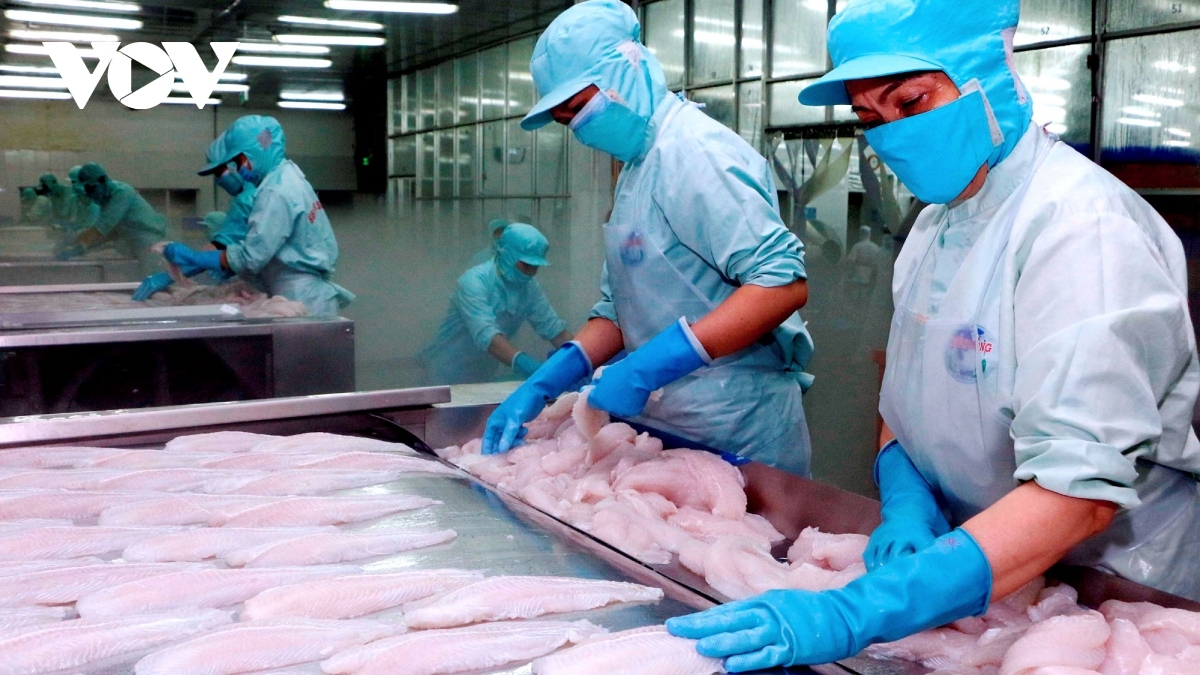Post-pandemic EVFTA implementation requires timely boost
VOV.VN - Free trade plays an essential role in promoting economic growth in the post-pandemic period, particularly as it will help to reposition Vietnamese relations with the 27 member states of the European Union (EU), reports Dau Tu (Investment) newspaper.
Faster market penetration

Promoting two-way trade between the nation and the EU, as well as attracting foreign direct investment inflows from the bloc, are the two main pillars in implementing the EU-Vietnam Free Trade Agreement (EVFTA), experts shared at a recent workshop held in Hanoi.
Prof. Andreas Soffers, country director of the Friedrich Naumann Foundation for Freedom Institute in Vietnam (FNF), noted that the enforcement of the EVFTA, starting in August 2020, has brought with it many advantages for both sides in terms of investment and trade.
Statistics from the Ministry of Industry and Trade indicate that despite the negative impact caused by the COVID-19 pandemic, two-way trade between Vietnam and the bloc reached US$57 billion last year, up 15% from the previous year. Of the total value, the country shipped US$40.07 billion worth of exports to the EU, an increase of 14%, whilst it spent US$17 billion on imports from the bloc, up 16.1% compared to 2020.
Typically, Vietnamese exports mainly focus on a few large markets such as Germany, the Netherlands, France, and Italy, while the market share of local products in other markets throughout the bloc remains modest compared to the pre-EVFTA period.
Though Vietnam is ready for the EVFTA implementation, there remains much work to be done, said Prof. Soffers.
He suggested that Vietnamese businesses open the market up to each EU member state more strongly, reasoning that the bloc proves to be a neutral and fair trading partner amid rising tensions between the United States and China.
The faster that market penetration occurs, the greater benefits Vietnamese export industries will reap from the process, said the researcher.
Participating in the workshop from Europe, Dr. John Fitzgerald of Trinity University (UK) pointed out that international trade is crucial to Europe, especially in the context that the COVID-19 pandemic has disrupted the global supply chain over the past two years.
This year the EU’s inflation is anticipated to hover at roughly 5% or even higher due to various factors, including the armed conflict between Russia and Ukraine. However, he said the recovery of the global economy, including a strong increase in consumer demand from the EU, will present a golden opportunity for Vietnamese suppliers to make the most of.
In his opinion, the global economy is expected to return to normal by 2024, and the EVFTA will then create a sustainable two-way trade channel.
Over the long term, if powers such as the EU and the United States seriously implement climate change commitments, greater investments will be funneled into energy projects that will benefit other countries, including Vietnam, said Dr. Fitzgerald.
Despite the challenges presented by COVID-19, Vietnam still attracted more than US$31 billion in FDI capital last year. The majority of the capital flows were sourced from Japan and the Republic of Korea, while capital from the EU remained limited. This would serve to motivate EU businesses to increase their investment into the Vietnamese market over the coming years thanks to the EVFTA and the impending EU-Vietnam Investment Protection Agreement (EVIPA), said Dr. Fitzgerald.
Redressing shortcomings
Making an in-depth analysis of the impact of the EVFTA on import-export and investment activities, Nguyen Thi Thu Trang, director of the Center for World Trade Organisation and Integration of the Vietnam Chamber of Commerce and Industry, said Vietnam’s trade growth with the EU remains modest compared to that between Vietnam and the rest of the world.
She advised businesses to tap into the EVFTA more efficiently by studying EU requirements, particularly as “this is a very demanding market”, citing the bloc’s imposition of its yellow card on Vietnamese seafood exports as a valuable lesson.
“Vietnamese exports to the bloc will even face fiercer competition in the post pandemic period, and if Vietnamese businesses do not sharpen their competitive edge, especially their ability to cope with market fluctuations and when many Asian countries are speeding up FTA negotiations with Europe, their exports to this market will hardly be improved,” said Trang.
Emphasising the role of international trade in the post-pandemic economic recovery process, Vu Thi Thanh Huyen, an official of the General Statistics Office, also suggested that local businesses strive to increase exports and trade exchanges with the EU.
“The first benefit we can enjoy from implementing the EVFTA is tariff incentives, but such incentives on several key exports for instance garments are quite small, because our products do not have a brand, while we mainly import raw materials and accessories from outside markets that are not subject to the incentives,” Huyen stated.
“It is necessary to quickly overcome these limitations in order to enjoy substantive incentives,” she stressed.
